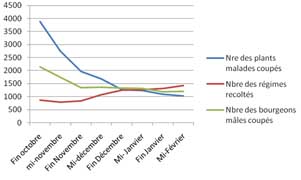07/05/2012A previous story described the process of introducing a new technology to DRC from Uganda for the suppression of bacterial banana wilt (or “BXW” as it is known), a disease which was ravaging production in Nord Kivu province where banana is an important staple food. The method for disease management was introduced to Bweremana in Nord Kivu from Uganda, in a real example of South-South cooperation.
Since October 2011, 150 banana farmers from the district have been taking part in a pilot to test the new BXW control method (based on removing the male bud of the plant, cutting any infected plants at the base, and taking care cleaning tools to avoid further transmission of the disease).
The first results, now in, are extremely encouraging. The method has reduced incidence of the disease dramatically, and yields have increased by around 80% (bunches which would have become infected have been protected). Over the next few months we expect to see further increases as the plantations re-generate. Banana bunches sell for around $5; so already the result is an average increase of around $50 per month in income for the participating farmers, while the cost of following up using local agronomists has been around $2,000 per month.

Even though the pilot is still ongoing, the method is already being adopted in programmes by other NGOs active in the province. And a general campaign against BXW launched last year has the full support of the provincial Minister of Agriculture and the provincial Inspector
Another encouraging sign is the method is being passed from farmer to farmer:
Mme Kahindo Kasuku, from Ngumba village, Lutobogo locality, widow and mother of 3 children, (interviewed, 12 April 2012):
"I am one of the persons trained by Mr Kyahi Salumu (my neighbor). Before, when Mr Kyahi came and trained me I said 'it is a joke, it won’t work, you are wasting your time'. Afterwards, he came to cut the male buds in my garden using a forked stick (to twist them off); he said if I did what he was doing I would be able to control the disease in my garden. But I told him he might as well give me the garden used for the macro-propagation project (which was badly infected with BXW) so I could plant beans in it, because I still thought it was ridiculous. But after he showed me, and gave me a forked stick, I began using it, and now there are no more sick plants in my garden and I’ve already harvested 5 good bunches. This means I can send the children to school and buy food”
This activity has been co-funded by the FMM Netherlands contribution and by the Belgian funded regional project (BEL/117) which launched in January 2012. This regional project – run by FAO’s Regional Emergency Office for Africa in Nairobi - aims at improving resilience of communities to banana diseases more generally. The project covers Tanzania, Rwanda, Burundi and eastern DRC, as well as Uganda. It draws on this and similar experiences to encourage pro-active management of crop diseases, and builds capacity for contingency planning, risk assessment and improved coordination of disease management campaigns. It also aims to scale up the adoption of specific lessons in improved management of banana production systems, which come from research in Uganda, and from partners in CIALCA (the Consortium for Improving Agricultural Livelihoods in Central Africa) including Bioversity and IITA.